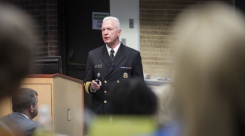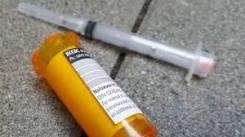Opioid Use Disorder Documented at Delivery Hospitalization — United States, 1999–2014
Sarah C. Haight, Jean Y. Ko, Van T. Tong, Michele K. Bohm, William M. Callaghan
August 14, 2018
Opioid use by pregnant women represents a significant public health concern given the association of opioid exposure and adverse maternal and neonatal outcomes, including preterm labor, stillbirth, neonatal abstinence syndrome, and maternal mortality (1,2). State-level actions are critical to curbing the opioid epidemic through programs and policies to reduce use of prescription opioids and illegal opioids including heroin and illicitly manufactured fentanyl, both of which contribute to the epidemic (3).
First lady visits Children’s Hospital to learn about VUMC’s opioid approach
Christina Echegaray
August 14, 2018
First lady Melania Trump visited Monroe Carell Jr. Children’s Hospital at Vanderbilt Tuesday to learn firsthand about Team Hope, Vanderbilt’s multidisciplinary team focused on helping infants born with neonatal abstinence syndrome (NAS) as well as their families.
Trump’s stop in Nashville was part of her Be Best campaign, which launched in May and focuses on children in their individual paths, stressing their social, emotional and physical health. The campaign’s three main pillars focus on well-being, social media use and opioid abuse.
Integrated, multidisciplinary approach key to opioid fight: panel
Bill Snyder
August 14, 2018
No single approach will end the epidemic of fatal overdoses caused by addiction to opioid painkillers and heroin that is ravaging this country, the U.S. Assistant Secretary for Health, Adm. Brett Giroir, MD, warned Tuesday during a panel discussion in a packed lecture hall at Vanderbilt University Medical Center.
Team Hope program’s mission is to enhance care for newborns with NAS
Christina Echegaray
August 14, 2018
Early discharge of NAS infants prolongs treatment
Christina Echegaray
June 8, 2018
Infants who are diagnosed with drug withdrawal after birth who are treated with medication as outpatients at home are treated three times longer than infants treated solely as inpatients, according to a new Vanderbilt study.
Neonatal abstinence syndrome (NAS) is a drug withdrawal syndrome that occurs shortly after birth, and can occur when an infant is exposed to an opioid during the pregnancy.
Origins of an Epidemic: Purdue Pharma Knew Its Opioids Were Widely Abused
Barry Meier
June 8, 2018
Purdue Pharma, the company that planted the seeds of the opioid epidemic through its aggressive marketing of OxyContin, has long claimed it was unaware of the powerful opioid painkiller’s growing abuse until years after it went on the market.
But a copy of a confidential Justice Department report shows that federal prosecutors investigating the company found that Purdue Pharma knew about “significant” abuse of OxyContin in the first years after the drug’s introduction in 1996 and concealed that information.
Policing and the Opioid Crisis: Standards of Care
Bloomberg American Health Initiative
June 8, 2018
From Stolen Pills to the U.S. Public Health Service: My Story of Recovery
Christopher Jones
June 8, 2018
I’m a captain in the Commissioned Corps of the U.S. Public Health Service. I hold a position of responsibility at HHS working on the nation’s opioids crisis and serious mental illness initiatives — and I’ve been in recovery from addiction for more than 16 years.
It’s not easy to open my life story to the public, but I want to share it in hopes of showing others struggling with addiction that recovery is possible. I want to fight the stigma of addiction that has kept so many hidden and made it difficult for them to seek the help they need.
Why it’s not ‘enabling’ to make drug use safer
Maia Szalavitz
June 8, 2018
In the face of an unabating overdose crisis that has already killed more than a half-million people, San Francisco, Philadelphia and Seattle have announced plans to do what was once unthinkable: open centers where people can inject illegal drugs under medical supervision. Many other cities are also debating so-called safe infection facilities (SIFs) — but unfortunately, a common misconception about addiction stands in the way.










